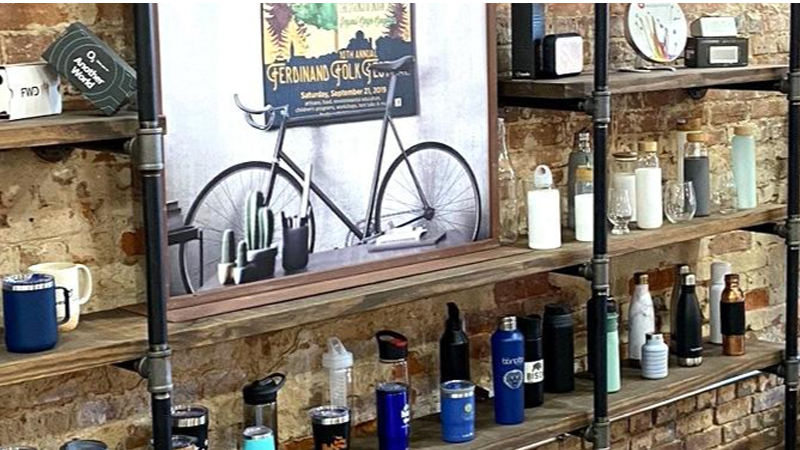Education
August 8, 2023
How to Create a Sample Room

# Sales and Marketing
9 tips from Dscoop colleagues around the world

Dedicating space in your office to showcase successful projects is a smart move that's helping printers win business. If you're thinking about creating your own sample room, here are 9 tips from Dscoop colleagues around the world.
A growing number of print and marketing services firms worldwide have made sample rooms a key element of their business strategies. These dedicated spaces are helping Dscoopers generate interest and business, and they're great places to hold creative conversations with clients and prospects.
9 Smart Tips From Fellow Dscoopers
If you're considering a dedicated showroom space of your own, here are 9 tips culled from leaders at Branded By Woods in the USA, QLM Label Makers in Vietnam, Aeroprint in the Netherlands and other Dscoop members:
1. Create a space that aligns with your brand message.
"The room should reflect the core values of you as a company," says Erwin Koerts, technical director of Aeroprint. Many of his company's clients are high-end designers and retailers, so the sample room at Aeroprint evokes the feeling of exclusivity.
In contrast, creative/print firm Branded By Woods' space is intentionally irreverent (visitors see bicycles, guitars and beer taps), and it's visible from the street to evoke openness. "We have stuff in our space that we don't ever plan to sell. But they're here because people gravitate toward them and they open up about their situations," says Brian Craig, the company's COO and president.
2. Invite clients and prospects to be interactive.
Your sample room shouldn't feel like an untouchable museum, printers say. Consider adding elements - lounge chairs, TVs, crackers and dip, etc. - that make visitors feel comfortable. Make sure visitors know your samples can be picked up and felt, not just idly discussed.
At QLM Label Makers, people who enter the client experience space are encouraged to have fun exploring different label, packaging and print options. "More than anything, your space should be a place where people feel free to connect with your work and your team," says Lindsay Nutley, the company's marketing director. "We want visitors to pick up samples without worrying about putting them back correctly. We want it to feel like ordered chaos."
3. When deciding how to organize samples, consider your audience.
If the typical visitor to your space is already educated about the nuances of print options, you might want to include placards that clearly indicate products and benefits ("metallic effect," "matte finish," etc.). In that case, it's also smart to categorize samples by feature, benefit or even budget. In Janus International's experience center, for example, labels are clearly categorized by type, which helps visitors to focus on specific applications. Adds Erwin, "If you're talking to an experienced print buyer, you can go a long way in describing whatever you can. They're mostly looking for assurance."
Conversely, if your typical visitor is less versed in print, consider labeling nothing, instead making the space feel like a creative playroom. They're mostly looking for inspiration.
4. Start conversations by talking about the end.
What do your visitors want to accomplish? What's their real objective? "The solution ends up better when that's the beginning," says Brian of Branded By Woods. He and CEO Devin Craig encourage showroom visitors to talk about their best customers - what they need and how different kinds of print and promotional items might make them feel.
5. Create a schedule to keep the room updated with fresh samples.
A sample room that never changes is akin to a website blog that's never updated - people who visit more than once will quickly notice.
"Each time you walk into the room, try to imagine experiencing it for the first time," suggests Lindsay. "Look at the space with active eyes. What would a new person see?" He recommends updating your space at least quarterly.
At Branded By Woods, the team rotates print and apparel samples a few times a year, keying on seasonal trends and upcoming holidays. It also includes some self-marketing pieces in the mix, showing that the company uses its own suggestions.
6. Communicate the mission of the space to your team, and solicit feedback from salespeople and customer service specialists about new projects to showcase.
Communicate with your internal team about how the sample room is supporting your company's brand. Everyone on staff should be able to articulate why there's a showroom.
Also, what is your team handling right now that might be a good inclusion next month for the sample room? Make it easy for salespeople and customer service representatives to suggest new inclusions for the space that might appeal to other clients with similar challenges and goals.
7. Pay attention to lighting.
This tip sounds simple, but printers say it's important: Don't let your space to go waste because it's too difficult for people to see and experience your samples. At Aeroprint, the team installed multiple rows of track lighting on the ceiling as well as spotlights on shelves to best feature different products.
8. Promote the room by hosting an open house. Branded By Woods recently joined forces with a nearby brewery to host a Christmas event that included drinkware giveaways and other products sold by the creative/print company. "It got people talking about what we did, and was a great experience," Brian says.
9. Think of your space when promoting your company in videos, on social media and through other channels.
Here's an example of a company - premium photobook maker Printovate in Bangalore, India - that created a video showing its sample room. Here's another example of a way to feature different samples in video promotions.
If you create a sample room and want to talk about with the Dscoopers mentioned in this article, please let us know!
Sign in or Join the community
Innovating Print, Together

Create an account
Innovating Print, Together
Dive in
Related
35:31
Video
All About Print Leads: How to Market & Sell to Them
By John Bracamontes • Nov 12th, 2024 • Views 100
35:31
Video
All About Print Leads: How to Market & Sell to Them
By John Bracamontes • Nov 12th, 2024 • Views 100